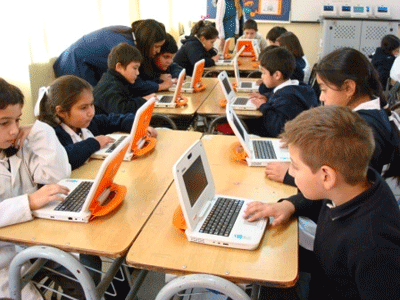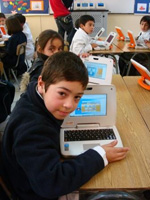New Information and Communications Technologies
Contribute to Improve Quality and Equality in Education

Photo: Enlaces, MINEDUC
Latin American nations are striving to develop projects that include the use of new information and communications technologies (ICTs) in education.
Costa Rica, for example, has been carrying out a National Programme on Educational Informatics since 1988 aimed at improving the quality and equality of education opportunities of low-income students. To do this, new learning environments were introduced in schools with the help of digital technologies.
Chile created the Enlaces programme in 1992, also with the goal of contributing to improve the quality and equality of education. Brazil, Mexico, Colombia and Argentina implemented similar initiatives in the 1990s and as of the year 2000, practically all of the countries in the region have followed suit.
ICTs are a strategic means to advance towards the information society and are fundamental to attaining equality. They have become vital tools to address the region's challenges in education.
ICTs provide an opportunity to address pending gaps in the quality of education (improving teaching and learning processes and student achievement), efficiency (management of educational system, schools and programme contents in the classroom) and equality at different levels.
Incorporating ICTs in education in Latin America has been possible through public policies, primarily through programmes and projects. Although currently a third of countries in the region have formal policies for ICTs in education, most are developing initiatives and have set up specialized units within their education ministries.
At first, ICTs in education programmes focused on the provision of infrastructure, mainly by installing computer labs and providing basic training to teachers.
With the increasing expansion and development of the Internet, in the late 1990s these programmes began to include the provision of connectivity, content-generation through education portals and advanced teacher training. Efforts were also made to provide teachers with computers, certify their skills and create participatory networks.
Uruguay has applied the Ceibal Plan for years, the most advanced model of this kind in the region. The plan aims for every teacher and student in public schools to have a portable computer with Internet connection (laptops model XO) that they may use both in school and at home. The project strongly encourages family and community participation.
Current research is focused on establishing if the incorporation of ICTs in schools also improves learning and management. Large-scale studies that seek to determine the impact of ICTs in student learning – based on standard national or international tests – show that the relationship between the use of ICTs and learning is not lineal and requires more complex models to study it.
Addressing these difficulties requires identifying and disseminating what is considered to be good practices in the educational use of ICTs so that policy-makers and education administrators may create the right environment for their development.
The education project of the @LIS 2 programme carried out by ECLAC's Social Development Division seeks to contribute precisely to the exchange of ideas and practices that seem to have yielded good results, beyond the walls of the schools where they are implemented.
Despite the difficulties, there is consensus that the inclusion of ICTs in education is an inevitable need and that in our countries, this should be led by public policy. Although ICTs offer opportunities, they are also a source of eventual peril for the region&rsquo:s social development.
In this view, the current digital revolution can facilitate social inclusion and the universalization of citizen rights, or, on the contrary, it can lead to more polarized and fragmented societies.
If it is not guided through public policy, the dissemination and
massification of ICTs will be entirely at the mercy of the market,
potentially reproducing existing social gaps and creating new and
exponential differences.
* Prepared by ECLAC's Social Development Division
based on the Education Component
of the @LIS 2 Project, "Alliance for the Information Society 2
– Inclusive Political Dialogue and
Exchange of Experiences".
| Since 2000, practically all of the countries in the region have incorporated the use of new information and communications technologies (ICTs) in their education policies. | |
|
|
|
|
Through its Ceibal Plan, Uruguay aims for every teacher and
student in public schools to have a portable computer with
Internet connection that they may use both in school and at
home. |
|

|
|